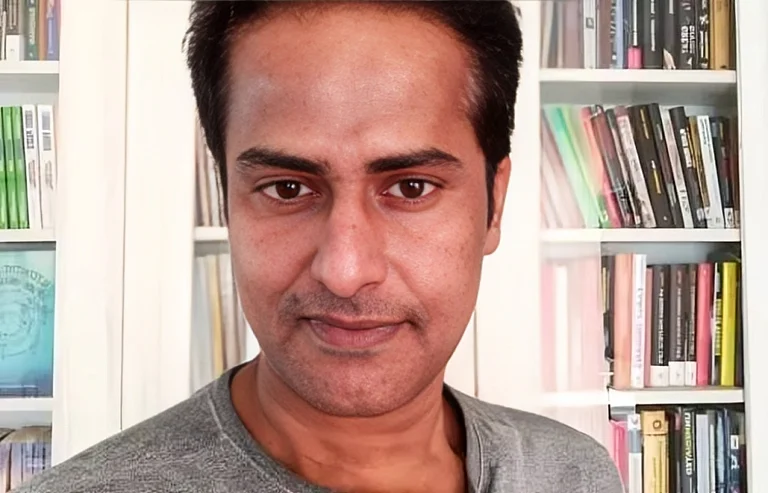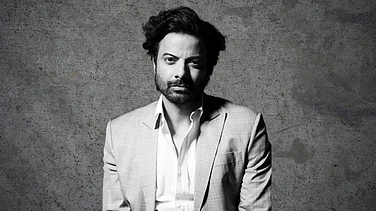As a director-producer, Achal Mishra says he wants "complete control" over a project even if it means telling stories on a limited budget with a small crew.
The 27-year-old, who started his filmmaking journey with 2019's "Gamak Ghar", has made his second film "Dhuin" with three people and no predefined budget. He is also the editor and producer of the movie, which was screened on the second day of The Himalayan Film Festival here.
"When making a film like 'Gamak Ghar', a lot of creative decisions, I realised, were being defined by how I learnt filmmaking... That became a decisive thing in understanding a budget.
"With budget, I've realised it also defines your process of how you are going to make a film. And, I don't want to write a film first and go on the floor and shoot it. I want to keep it as open as possible. Having a small budget and small crew allows that," Mishra told PTI in an interview.
Asked if he would like to have a producer on board, Mishra said that's a question he was still finding his way around.
"While shooting, I want complete control. Even after shooting the film, it's the authority that lets you have control over something as simple as the duration of a film," the photographer-director said.
Mishra gave the example of "Dhuin", which at 50 minutes runtime doesn't traditionally fit under the category of either a short film or a full-fledged feature film.
"There was no one else involved (as producer on 'Dhuin'). Had there been anyone else, it would have become 30 minutes or 1 hour 30 minutes (in length). If somebody lets me have that sort of freedom, then definitely (I'll take on a producer)," he added.
With a bigger crew, the Darbhanga-born filmmaker said there's always a possibility of second guessing one's instincts.
"You'll say 'Am I indulging?' because you are answerable to everyone. So, you need that freedom and that comes with not having (a set budget). You find the film as you make it," he said.
Mishra, who briefly studied filmmaking at London's King's College, said he started out with making films on short stories by Satyajit Ray and Munshi Premchand and put them online.
"I would be in my hometown Darbhanga, pick up my camera and go shoot something. I'd pick a short story and make a film on it.
"Short story not because it would speak to me but because this is the easiest to me... And I would do it all on my own. I would do the camera on my own, edit it, put it up on YouTube. This was like my film school where the question of budget was never there," he said.
Being a photographer, camera movements are also something he is trying to learn on the job, Mishra said.
The nostalgic "Gamak Ghar", a film shot in the filmmaker's ancestral house, and "Dhuin", which revolves around Pankaj (played by Abhinav Jha), a small-town theatre actor who hopes to make it big in Mumbai -- both are set in his hometown Darbhanga in Bihar.
The director is also working on the next part of his 'Darbhanga trilogy', he revealed.
"When I was doing 'Gamak Ghar', I didn't have enough confidence to move the camera because I think it's a device that needs to be used smartly and organically. 'Dhuin', as a process, was free," he added.
"Dhuin", a Hindi-Maithili language film, has many references to popular actor Pankaj Tripathi, who also belongs to Bihar. It's simply a coincidence that the name of the "Dhuin" protagonist is Pankaj, he said.
"Earlier we were planning a scene where he (protagonist) would be looking at an interview of someone like maybe Nawazuddin (Siddiqui).
"Being in Bihar, Darbhanga, we thought Pankaj Tripathi makes more sense here... When we decided to have that scene, we realised our character is also called Pankaj," he said, adding that Tripathi had called him after watching "Gamak Ghar".
The National Award winner expressed a desire to collaborate with Mishra on a film set in the director's hometown.
"He said, 'Dost, agli film tumhare saath Darbhanga mein karenge' (I'll do my next film with you in Darbhanga.) At that time, I'd get excited by something very easily. For the next 20 days, I kept thinking about writing a film with Pankaj Tripathi in it... Hopefully, some day I'd love to work with him," Mishra said.
The filmmaker recently shot his next film "Ri" in Ladakh. The title of the film means 'mountain' in Tibetan and Ladakhi languages.
Mishra described the film as "a mosaic of different people and landscape wildlife". The filming took two months and numerous outings in the "blue hour" after 7.30 am for 45 minutes.
"For two months, I travelled across Ladakh and it's going to be a very different film. Also because I wanted to run away from Darbhanga because you tend to get labelled in a certain way and I also wanted to see if I can try something else. I'm not worried about the narrative or anything else. Just looking at this landscape through your camera as cinematically as possible," he said.
The second edition of The Himalayan Film Festival concludes on October 3.


























